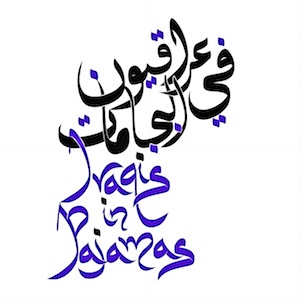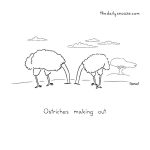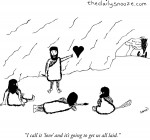There is something somewhat intimate about being woken up in the middle of the night by rocket sirens. Feet and arms lightly intertwined with my wife’s, feeling a slight tug of the cover to her side in the never-ending battle-of-the-blankets, I am startled by the sound. I am slow to make sense of the sirens, which are coming both from outside and my cellphone, the latter also providing a strobe-light effect. I look to my wife, nudge her and say in a most loving but rushed tone, “Let’s go! Missiles!”
Remember those Love is… comic strips of the 1970s by New Zealand cartoonist and love culturalist Kim Casall? Well, how about Love Is… waking up snuggled together to a missile alert? Not the free love and innocence of the hippie generation, but for sure love!
And what about Love is… ensuring your wife enters the safe room first. How’s that for being a gentleman? As the sirens go off and we rush to our safe room, my wife goes in first, then I rush in after her, slamming shut the heavy iron door behind us. Actually, if our kids are home or we have guests, I will make sure everyone is inside – including our dog – before entering. Just seems like the right thing to do, danger be damned. How’s that for bravado?
***
Speaking of love. Returned from Tel Aviv with my wife the other day. Incoming missiles and a known routine. Pull over. Exit car. Move away from the vehicle. Crouch down on roadside. Cover your head with your hands (though I don’t know how that helps if a missile strikes you). So, there was my wife, huddled next to me, while the Iron Dome chased and intercepted its overhead target. In a chivalrous act of protection, I hovered over my wife, giving her a second layer of armour. I hugged her. Amazing how adrenalin works. Love is… shielding your wife from incoming missiles.
In a similar spirit. Love is… being alone with your wife in the safe room during missile alerts. It’s not for no reason that births spike during wartime.
***
Then there’s our morning routine. Prewar, it was pillow talk about the chores ahead. Now, the first thing we cross-check is Code Red missile alerts received on our cellphones overnight. Where were the sirens? Where did the missiles land? Or almost land? Other carnage or near-carnage? Other military developments? Not the most romantic of topics but that’s where our minds are these days – from the moment we wake up until we fall asleep. Love is… lying in bed together comparing missile alerts and military actions.
***
The other week, during Iran’s second cruise missile attack on Israel, where more than 180 missiles were fired at our little shtetl with the intent to exact maximum, indiscriminate death and destruction, there was significant news chatter about the attack. Under the fog of war, not fully clear what to expect.
My wife, who works in Tel Aviv, just completed her shift and was taking a bus home. She called to advise me that her bus was late and that her cellphone battery was running low, so I shouldn’t worry if she’s delayed and doesn’t answer. Shortly after our conversation came the news flash about a mega-casualty terrorist attack in nearby Jaffa and another attempted attack in Tel Aviv. I tried calling my wife back. No answer. Wishfully and optimistically, I attributed it to no battery.
Then the news flash that Iran had fired several hundred cruise missiles at Israel. Expected to arrive in our airspace within the next … 12 minutes. Not 10 minutes, not 15, but 12. This was for real! Where was my wife?! There was no way to call her, to learn of her whereabouts.
If she were on the bus during a missile barrage, what would happen? Would the driver follow Homefront commands? Would the bus pull over? Would the passengers get off the bus? Would they crouch down away from the bus with their hands covering their heads? Would someone hover over my wife … protect her?
Time is ticking – three minutes from the expected cruise missile impact. Anxiously pacing the living room, I keep looking to the news for some insight about something. Then, I hear the elevator. I run into the hallway, watching the red digits slowing climbing to my floor. One. Two. Three. Four. Five. The door opens. There she is. In all her beauty. Somewhat frazzled-looking. I give her a giant, protective bear hug. Immediately, sirens go off throughout the city and our cellphones buzz and flash with missile alerts. My wife arrived literally in the nick of time.
We quickly make our way to the safe room. My wife enters first. I slam the door shut behind us. With her tension unravelling, my wife begins to cry – from exhaustion, from stress, from survival. Again, we embrace.
Love is… holding your wife near in the safety of your safe room during a missile attack.
***
Please continue donating to the Israeli war and revival efforts, or buy Israel Bonds. Twelve months after the Oct. 7, 2023, Hamas terror attacks, the war is still raging, and on several active fronts. Sderot and Metula – and even Tel Aviv and Haifa – are Israel’s front lines. And Israel is the diaspora’s front line.
Bring them home now.
Bruce Brown, a Canadian-Israeli, made aliyah more than 25 years ago. He works in high-tech and is happily married, with two kids. He is the winner of a 2019 American Jewish Press Association Simon Rockower Award for excellence in Jewish writing.




